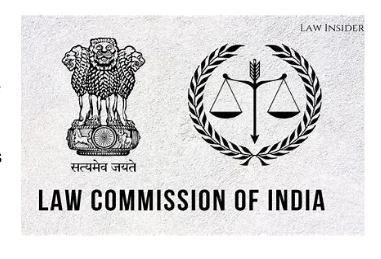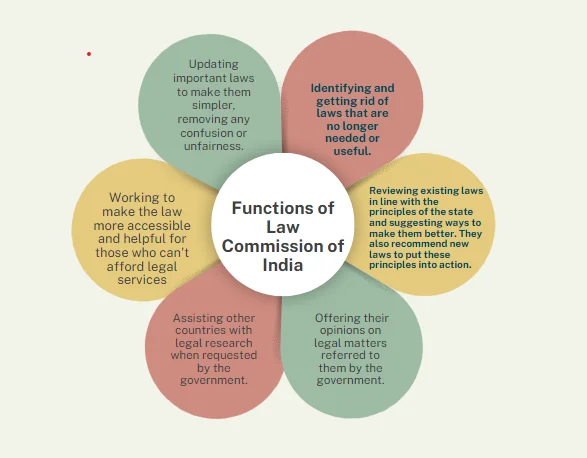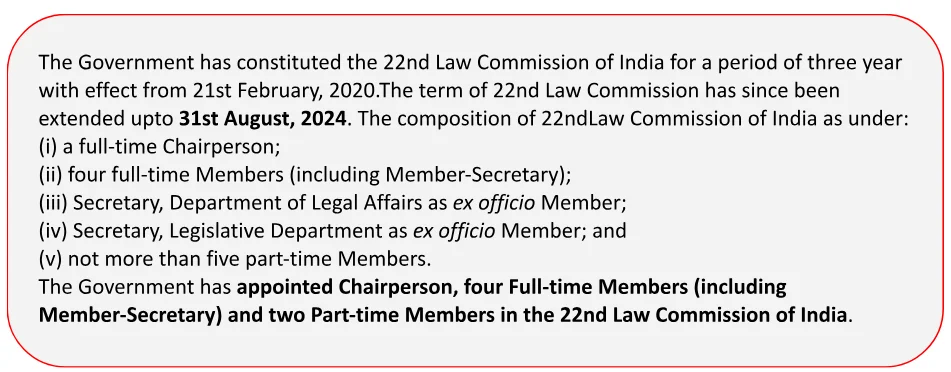The Law Commission of India is a vital advisory body established to improve and modernize the country’s legal system. Formed every three years by the Government of India, it conducts research and recommends changes to laws based on various references. With a rich history and numerous reports submitted, the Commission plays a crucial role in shaping legislation to meet the needs of society. Its work ensures that India’s laws remain relevant and effective.
The Law Commission of India
Overview of the Law Commission of India
- Law Commission of India is a non-statutory body and is constituted (constituted normally every three years) by a notification of the Government of India, issued by the Ministry of Law & Justice, Department of Legal Affairs, with definite terms of reference to carry out research in the field of law.
- Recommendations to the Government: The Commission makes recommendations to the Government (in the form of Reports) per its terms of reference.

- Subjects of Study: The Law Commission has taken up various subjects on references made by the –
- Department of Legal Affairs
- Supreme Court
- High Courts
- Reports Submitted: It has submitted 283 reports so far. The Law Commission of India provides an excellent, thought-provoking, and vital review of the laws in India.
Enroll now for UPSC Online Course
Historical Background
- Formation of Law Commissions: In the 19th century, when India was under British rule, four Law Commissions were formed.
- Role in Legal Improvement: These commissions played a crucial role in improving the Indian legal system.
- Adaptation of Legal Principles: They suggested various laws based on the legal principles from England, adjusted to suit the Indian context.
- Impact on Indian Legislation: As a result, several important laws like the Indian Penal Code, the Criminal Procedure Code, the Civil Procedure Code, the Indian Contract Act, the Indian Evidence Act, the Transfer of Property Act, and others were developed through the recommendations of these commissions.
| Name (Law Commission) | Formation Year | Chairman |
| First | 1834 | Lord Macaulay |
| Second | 1853 | Sir John Romilly |
| Third | 1861 | Sir John Romilly |
| Fourth | 1879 | Dr Whitney Stokes |
Composition
- The composition of the Commission is not fixed and can vary from one Commission to another. In general, it includes –
- A Chairman,
- Some full-time members,
- A member-secretary, and
- Some part-time members, depending on the specific areas of law that the Commission is tasked with studying and making recommendations on.
The Terms of Reference of the 22nd Law Commission
- Review and Repeal of Obsolete Laws: To review/repeal obsolete laws.
- Examination of Socio-Economic Legislation: To examine the laws which affect the poor and carry out post-audit for socio-economic legislations.
- Judicial Administration Review: To keep under review the system of judicial administration to ensure that it is responsive to the reasonable demands of the times.
- Evaluation of Laws and Directive Principles: To examine the existing laws in the light of Directive Principles of State Policy.
- Suggestions for Improvement and Reform: To suggest ways of improvement and reform and to propose legislations necessary to implement the Directive Principles and attain the objectives set out in the Preamble to the Constitution.
- Promotion of Gender Equality: To examine existing laws with a view to promoting gender equality and suggesting amendments thereto.
- Revision of Central Acts: To revise the Central Acts of general importance to simplify them and remove anomalies, ambiguities, and inequities.
- Impact of Globalization: To examine the impact of globalization on food security and unemployment and recommend measures for the protection of the interests of the marginalized.

Functions
-
- Research Conducted by the Commission: The Commission, whether referred to by the Central Government, Supreme Court, or High Court or acting on its own initiative (suo-motu), conducts research in the field of law.
- Review of Existing Laws: It also reviews existing laws in India with the aim of suggesting reforms and proposing new legislation.
- Improvement of the Justice Delivery System: Additionally, the Commission conducts studies and research to improve the justice delivery system.
-
- Goals of the Commission: Its goals include reducing procedural delays, expediting case resolutions, and lowering the overall cost of legal proceedings.
- Contributions to Legal Development: Over time, various Commissions have made significant contributions to the ongoing development and systematization of the country’s legal framework
| Note:
The function of the Law Commission is to recommend legislative measures for the purpose of consolidation and codification of laws. However, its recommendations are not binding on the government. |
Working of Law Commission of India
- List of the Law Commission appointed so far are as follows:-
| Law Commission Report | Chairman |
| First Law Commission ( 1 to 14 ) | Chairman Mr. M. C. Setalvad (1955-1958) |
| Second Law Commission ( 15 to 22 ) | Chairman Mr. Justice T. L. Venkatrama Aiyar (1958-1961) |
| Third Law Commission ( 23 to 28 ) | Chairman Mr. Justice J. L. Kapur (1961-1964) |
| Fourth Law Commission ( 29 to 38 ) | Chairman Mr. Justice J. L. Kapur (1964-1968) |
| Fifth Law Commission ( 39 to 44 ) | Chairman Mr. K. V. K. Sundaram (1968-1971) |
| Sixth Law Commission ( 45 to 61 ) | Chairman Mr. Justice Dr. P. B. Gajendragadkar (1971-1974) |
| Seventh Law Commission ( 62 to 70 ) | Chairman Mr. Justice Dr. P. B. Gajendragadkar (1974-1977) |
| Eighth Law Commission ( 71 to 80 ) | Chairman Mr. Justice H. R. Khanna, (1977-1979) |
| Ninth Law Commission ( 81 to 87 ) | Chairman Mr. Justice P. V. Dixit (1979-1980) |
| Tenth Law Commission ( 88 to 113 ) | Chairman Mr. Justice K. K. Mathew (1981-1985) |
| Eleventh Law Commission ( 114 to 131 ) | Chairman Mr. Justice D. A. Desai (1985-1988) |
| Twelfth Law Commission ( 132 to 143 ) | Chairman Mr. Justice M. P. Thakkar (1988-1991) |
| Thirteenth Law Commission ( 144 to 153 ) | Chairman Mr. Justice K. N. Singh (1991-1994) |
| Fourteenth Law Commission ( 154 to 156 ) | Chairman Mr. Justice K. J. Reddy (1995-1997) |
| Fifteenth Law Commission ( 157 to 174 ) | Chairman Mr. Justice B. P. Jeevan Reddy (1997-2000) |
|
Sixteenth Law Commission ( 175 to 185 ) |
Chairman Mr. Justice B. P. Jeevan Reddy (2000-2001) & Chairman Mr. Justice M. Jagannadha Rao (2002-2003) |
|
Seventeenth Law Commission ( 186 to 201 ) |
Chairman Mr. Justice M. Jagannadha Rao (2003-2006) |
| Eighteenth Law Commission ( 202 to 234 ) | Chairman Dr. Justice AR. Lakshmanan (2007-2009) |
| Nineteenth Law Commission ( 235 to 243 ) | Chairman Mr. Justice P. V. Reddi (2009-2012) |
| Twentieth Law Commission ( 244 to 262 ) | Chairman Mr. Justice D. K. Jain (2013-2013) & Chairman Mr. Justice A. P. Shah (2013-2015) |
| Twenty-First Law Commission ( 263 to 277 ) | Chairman Dr. Justice B.S. Chauhan, (2015-2018) |
| Twenty-second Law Commission ( 278 to 283) | Chairman, Justice Ritu Raj Awasthi (2020-2024) |
Impact of Law Commission Report
Pre-Independence
- The following acts were enacted in response to the recommendations of the pre-independence Law Commissions:
- Religious Endowments Act of 1863,
- The Official Trustees Act of 1864,
- The Carriers Act of 1865,
- The Indian Companies Act of 1866,
- The General Clauses Act of 1868,
- The Divorce Act of 1869,
- The Court Fees Act of 1870,
- The Land Acquisition Act of 1870,
- The Female Infanticide Prevention Act of 1870,
- and the Code of Criminal Procedure Revised in 1872
Post-Independence
- History of Legal Reforms Post-Independence: Since its founding in 1955, the Law Commission of India has a long history of successfully enacting legal reforms following independence.
- Of the 283 reports, the government has implemented 92 of them.
- Key Reports by the First Law Commission” The first Law Commission of India issued its fourteenth report, titled “Reforms of Judicial Administration.”
- A comprehensive report for the revision Code of Criminal Procedure, namely the 41st report titled ‘The Code of Criminal Procedure, 1898’ was submitted in 1969.
- This report took into consideration the recommendations made in the earlier reports of the Commission dealing with specific matters, namely, the 14th, 25th, 32nd, 33rd, 36th, 37th, and 40th reports.
- Accordingly, all the reports resulted in the enactment of the new Code of Criminal Procedure 1973.
- Legislation Resulting from Law Commission Recommendations: The Right of Children to Free And Compulsory Education Act, 2009 was enacted as a result of the recommendations expressed in Report number 165.
- Repeal of Obsolete Laws: The National Green Tribunal Act, of 2010, was created as a result of recommendations in report number 186.
- The legislature has repealed approximately 1500 core Acts as a result of the recommendations made in the four reports—reports number 248 to 251—that the 20th Law Commission submitted.
- Recent Legislative Introductions: The Commercial Courts, Commercial Division, and Commercial Appellate Division, High Court Bill, 2015 was introduced in Parliament and has subsequently been approved, following the suggestion of Law Commission Report Number 253.
- Amendments to Existing Laws: With the help of Report Number 246 and the Arbitration and Conciliation (Amendment) Bill, the Arbitration and Conciliation Act of 1996 was amended.
- Reports Numbers 244 and 255 suggested strengthening the Election Commission of India’s office to implement electoral reforms and provide the organization with greater autonomy and sturdiness.
Enroll now for UPSC Online Course
| Must Read | |
| Current Affairs | Editorial Analysis |
| Upsc Notes | Upsc Blogs |
| NCERT Notes | Free Main Answer Writing |
Conclusion
The Law Commission of India has significantly influenced legal reforms in the country. Through its research and recommendations, it has helped draft new laws and amend existing ones, contributing to a fair and efficient legal framework.
- As India faces new challenges, the Commission continues to be essential in adapting laws to serve all citizens effectively.
- Its ongoing efforts ensure that the legal system evolves with the changing times.
Sign up for the PWOnlyIAS Online Course by Physics Wallah and start your journey to IAS success today!
| Related Articles | |
| LAW COMMISSION OF INDIA | Supreme Court |
| Economic Impact Of British Rule In India | High Courts in India |

 GS Foundation
GS Foundation Optional Course
Optional Course Combo Courses
Combo Courses Degree Program
Degree Program










